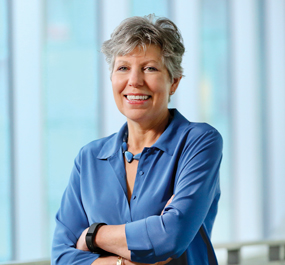Letter From the Editor

Mike Lovett
Laura Gardner, P’12
In the Office of Communications, Marketing and External Relations, we talk a lot about our brand narrative — the authentic story that describes and distinguishes Brandeis, and fuels the university’s engagement with alumni, friends, donors and prospective students. We know a brand narrative can succeed only if it reflects the experiences and aspirations of the audiences it seeks to engage.
Brandeis’ brand narrative is rooted in its singular history as the only nonsectarian university founded by the American Jewish community, at a time when Jews and others faced discrimination in higher education. That’s why inclusion has always been a bedrock value for Brandeis, long before it became widespread in the higher-ed ecosystem. We are inspired by our history, and we hope you are, too.
As a university steeped in Jewish values, Brandeis is driven by academic and scholarly excellence, and tikkun olam, the principle of using one’s gifts and talents to improve the world. These are core values, and they show up in countless ways across our community, from faculty research and teaching to alumni leadership and civic engagement. We are a deeply collaborative community, in the classroom, on campus and beyond. Students and faculty work together across and within disciplines. Alumni connect with students as mentors. Faculty across the university support one another as teachers and researchers. Brandeisians are proud of their Brandeis experience, right down to celebrating a certain quirkiness that people sometimes associate with the university and occasionally describe as “That’s so Brandeis.”
When you read this issue, you’ll find engaging stories that genuinely reflect this brand narrative.
Take our cover story, “A Kinder, Gentler Web,” which profiles Sahar Massachi ’11, GSAS MA’12, a former Facebook engineer who worked on the company’s Civic Engagement and Civic Integrity teams. Deeply shaped by his Brandeis education and a commitment to improving the world, he’s co-founded an independent organization to help create a more transparent social web, one less riddled with hate speech, bullying and hoaxes.
Another feature, “Burying the Past Is Not an Option,” looks at Women’s Studies Research Center affiliated scholar Karen Frostig’s efforts to memorialize the thousands of Jews, including her grandparents, who were murdered at the Jungfernhof concentration camp near Riga, Latvia, between 1941-43. Her work is supported by many collaborations with Brandeis faculty, alumni and even the campus’ MakerLab.
There’s so much more in this issue that speaks to our founding values and brand narrative. A conversation with University Professor Anita Hill about her life’s work in the fight for better protections against gender-based violence. An article about anthropological archaeologist Charles Golden’s quest to understand what caused Maya civilization to collapse. A feature about the Brandeis Educational Justice Initiative, which brings students, faculty and staff together to give people in the carceral system the skills and education they need to rejoin society.
I hope you enjoy reading this issue and meeting the Brandeisians in it. Maybe you’ll even find yourself saying, “That’s so Brandeis.”
As always, please send me your comments and feedback.
Best,
Laura Gardner, P’12
Editor-in-Chief
